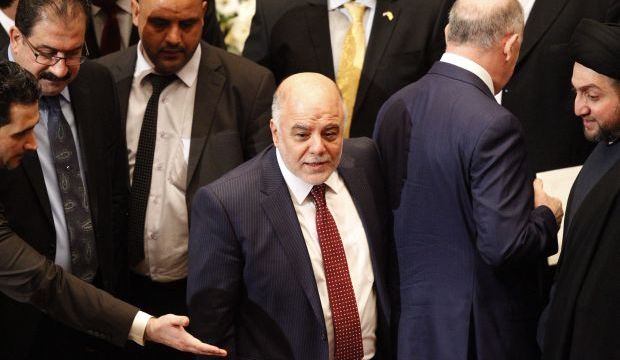The good news is that Iraqis have succeeded in forming a new government in a much shorter time than they have been used to since the fall of Saddam Hussein in 2003. The bad news is that the new government, headed by Prime Minister Haider Al-Abadi, looks more like a club of egos than an action group designed to deal with Iraq’s many problems.
While one may be prepared to give the new government the benefit of the doubt, it would be unwise to ignore its fundamental weaknesses.
The cabinet’s biggest weakness centers around its very design.
Abadi’s cabinet is primarily designed to do two things: to make rival Shi’ite, Sunni and Kurdish factions happy, and to give the big elephants of post-Saddam Iraqi politics seats at the high table. As a result of this second consideration Iraq now has a world record number of vice-presidents and deputy premiers, not to mention the dozen or so other unemployed politicians who are lining up to secure positions as “assistants” to the prime minister.
What Iraq needed, and still needs, is a government of national unity cutting across partisan divisions and focusing on two urgent problems: defeating the Islamic State of Iraq and Syria (ISIS), and rebuilding the nation’s shattered law and order infrastructure.
However, it is precisely those two key goals that remain unfulfilled because Abadi has failed to name either a defense or interior minister. He has ministers for everything else, including culture, the environment, and even planning, but cannot find anybody to reorganize the armed forces and restore the authority of the state across the nation’s 19 governorates.
The cabinet’s second weakness is that it was conceived on the basis of tactical considerations, not to say callous horse-trading, rather than the strategic needs of the war-torn nation. Abadi has built a machine, promising that he will tell us, and the Iraqi parliament, what that machine is supposed to do later.
The third weakness is that at the very best, of the 30 people who form the new administration—including the vice-presidents—at least half have been spending more time outside Iraq than at home. Several of them have homes in Amman, Tehran, Istanbul and London, among other places, commuting to Baghdad just once or twice a year.
Even of those who spend time in Iraq, many keep their families abroad. However, once a politician has two homes, one of the two is bound to fade away. An Iraqi politician must live in Baghdad, Mosul, Erbil, Basra or anywhere else inside Iraq. In other words, Iraq must be directly relevant to his life, and the life of his family.
The fourth weakness of the new cabinet is that it provides little scope for a new generation of post-liberation homegrown Iraqi politicians to claim a share of power. There are too many former exiles in this cabinet, not enough local men and women with organic links to their neighborhoods.
The fifth weakness is the importance that has been given to satisfying foreign powers rather than devising a new foreign policy aimed at the restoration of Iraq’s position as a contributor to regional peace and stability. As a result, the cabinet includes individuals who might make Americans, Arab powers and Iranians happy but might not always have Iraq’s best interests in mind.
The result is that we have a coalition of foreign powers within a coalition of domestic factions. Worse still, there are even factions within domestic factions, as the Shi’ites, Sunnis and Kurds are not even able to agree on common strategies for their respective communities. Threads from too many spools have come together to create an unholy tangle.
There are, of course, some good men and genuine patriots in the new administration. However there is no point in naming them as we have not named those about whom one might have serious reservations.
Though a disappointment, the new cabinet deserves to be given a chance.
It should identify its priorities, win support for them in parliament, and across the country at large, and focus on achieving them.
The top priority should be flushing ISIS out of the two or three provinces where it has set up shop. This requires Iraq to be in the driving seat rather than acting as sidekick to US or other foreign powers. To claim such a position, Iraqis must find ways of getting their act together beyond the Arab–Kurdish dichotomy, largely irrelevant under the circumstances. Iraq’s disintegration would put an end to whatever independence dreams some Kurdish leaders might entertain.
At the same time pan-Arabists must realize that the time when Kurds could be treated as second-class citizens is over. Post-Saddam Iraq can rebuild its unity only through diversity rather than uniformity imposed by terror.
However, it is still possible to be optimistic about Iraq for two reasons.
The first is that, despite years of effort by some, the machinery of repression, broken with Saddam’s fall, has not been revived. In Iraq today, power is not concentrated in a few hands. The weakness of governmental authorities, in Baghdad and at provincial levels, means a corresponding increase in the strength of civil society.
Though successive administrations tried to bribe or brow-beat their critics, Iraq’s new media remain diverse enough to prevent the imposition of a single narrative.
Another reason for hope is the diversity of the new Iraqi parliament, which includes some younger politicians who wish to see their nation move away from a system of terror and corruption as fast as possible.
Finally, one may also hope that the new president, a non-factitious figure, will use his position as a bully pulpit to speak in the name of Iraq as a whole.
